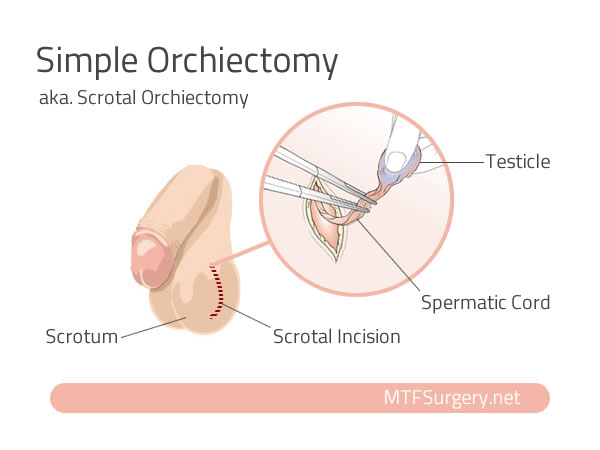MTF Surgery Procedures » Orchiectomy
Orchiectomy Surgery
Simple Orchiectomy / Scrotal Orchiectomy
Orchiectomy (aka. Orchidectomy) is a Male-to-Female Surgery procedure that removes the testicles. Orchiectomy results in sterility, and can reduce sex drive and male secondary characteristics, such as beard growth, due to the loss of testosterone. Many trans women choose to have this procedure and no further GRS, such as Vaginoplasty.
Benefits of Orchiectomy:
- Gender Affirmation
- Decrease in testosterone levels
- Potential to reduce exogenous estrogen and other hormonal requirements
- Decrease in thromboembolic and cardiovascular risk associated with high estrogen doses
- Elimination of spironolactone-associated diuretic effects
How Orchiectomy is Performed
There are a few types of Orchiectomy, including Simple Orchiectomy or Scrotal Orchiectomy, the procedure commonly used in MTF Surgery. With Simple Orchiectomy, the incisions are made in the scrotum.

The patient lies flat on an operating table with the penis taped against the abdomen. The nurse will shave a small area for the incision. After anesthetic has been administered, the surgeon makes an incision in the midpoint of the scrotum and cuts through the underlying tissue. The surgeon removes the testicles and parts of the spermatic cord through the incision. The incision is closed with two layers of sutures and covered with a surgical dressing.
Source: https://en.wikipedia.org/wiki/Orchiectomy
If you plan to have Vaginoplasty at a later date, be sure to discuss whether or not to remove scrotal skin during your Orchiectomy, as this tissue is often incorporated into Vaginoplasty procedures.
Orchiectomy is performed under general anesthesia and takes 30-60 minutes. It can be performed in a hospital or in an ambulatory (outpatient) clinic.
Trans women already on HRT may find that hormone dosages require adjustment after Orchiectomy Surgery. Orchiectomy eliminates the need for testosterone blockers and may permit lower doses of estrogen therapy in some trans women.
Orchiectomy in the O.R.
Orchiectomy Recovery
You will be able to go home or to your hotel room a few hours after your surgery. You must have a friend or family member pick you up after surgery. You will likely feel some pain and swelling. These can be alleviated with pain medication and icing. You will also be given anti-biotics to ward off infection. Keep the incisions clean and dry, and carefully clean the area when you bathe change your dressings.
You can go back to work after just a day or two, provided your job isn't very physical. Most patients can resume regular activities within one week of Orchiectomy Surgery.
After your surgery, you may experience various symptoms of hormone changes, including reduced sex drive, hot flashes, weight gain, mood swings or depression, and fatigue.
Orchiectomy Aftercare Tips:
- Stay hydrated. Drink plenty of water and avoid caffeinated and alcoholic beverages.
- Restrict yourself to light activities. Avoiding sex, heavy lifting, and exercise until you are cleared by your surgeon for these activities.
- Ice helps. Apply an ice pack to the groin area for the first 24–48 hours to reduce pain and swelling.
Surgery Requirements:
- Some surgeons require a period of Real Life Experience (RLE) in the female gender before performing surgery.
- The WPATH Standards of Care require one letter of recommendation from a qualified therapist. However, not all surgeons follow the Standards of Care and some will peform Orchiectomy Surgery on an informed consent basis.
Surgeons who perform Orchiectomy »
Last updated: 07/31/19